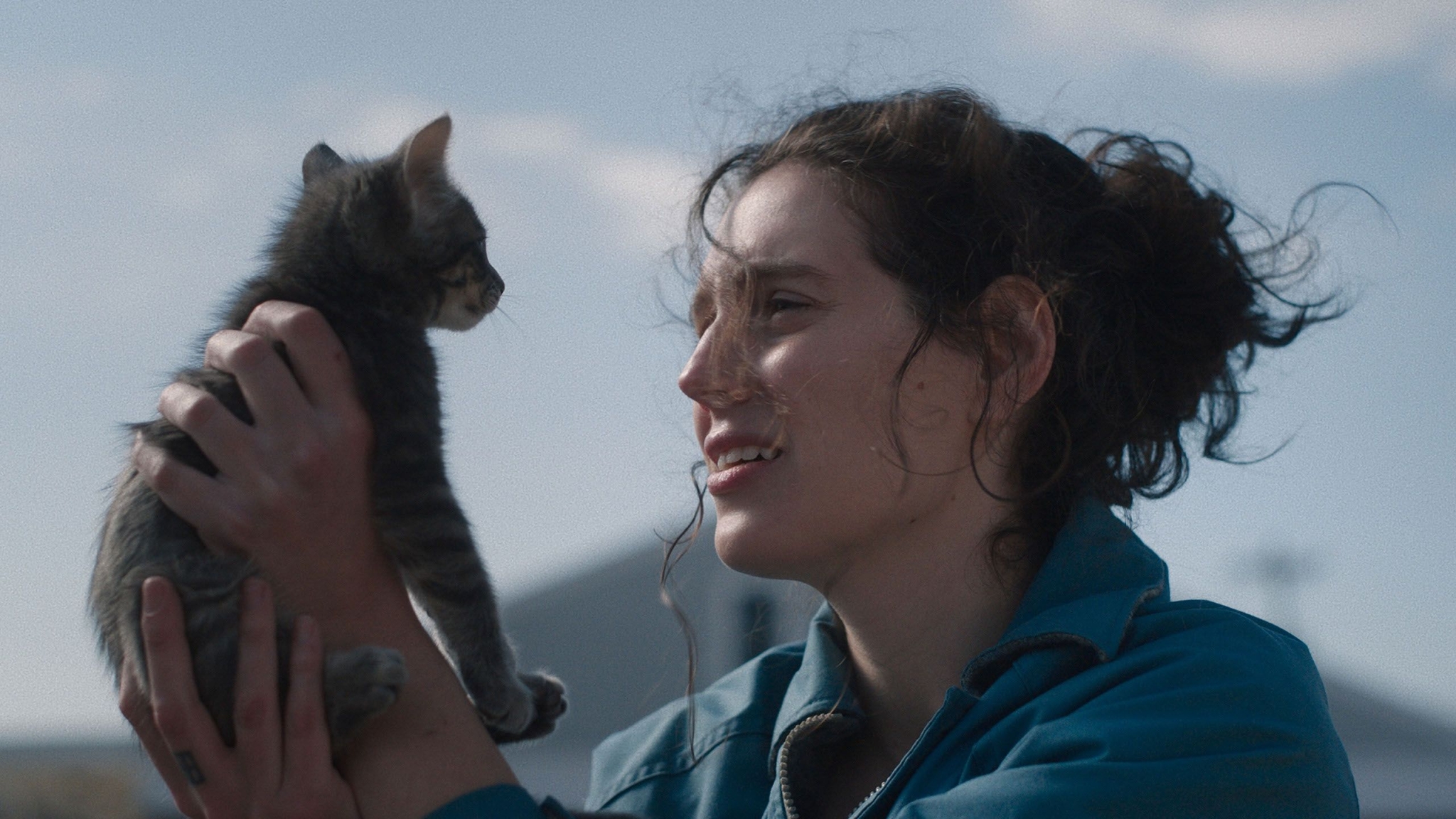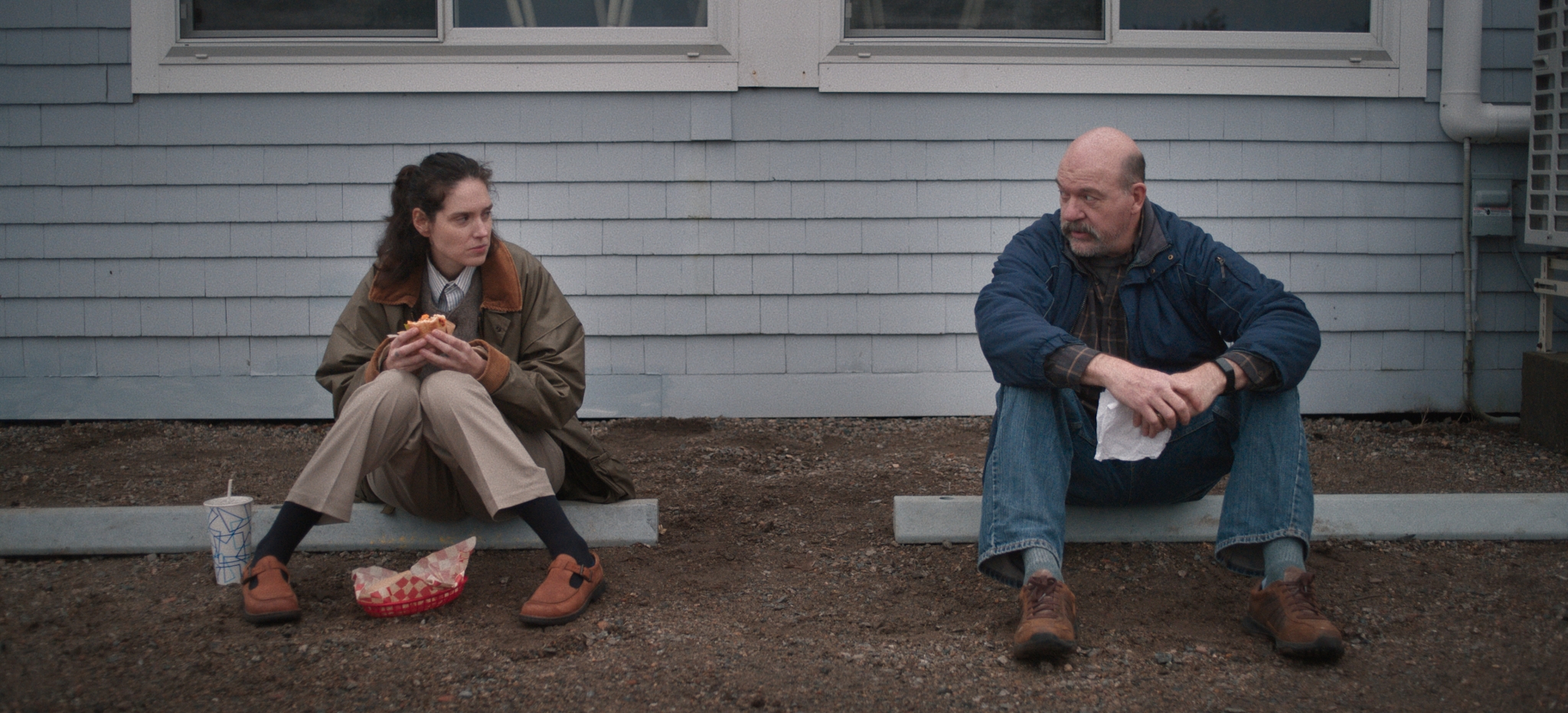
Laura Zeng pens an essay on Eva Victor’s Sorry, Baby, and a new sub-genre which aims to weave humour and kindness into the process of grief and recovery.
“Are we using the word ‘trauma’ too loosely as a culture?” my friend asked after we watched an hour-long comedy set at the annual Edinburgh Fringe. In the set, the word “trauma” was used generously to describe the inevitable slew of insecurities a parent will inflict on their child. Though the performer meant it playfully, the joke fell flat. Therapy-speak has become so deeply ingrained in the 21st-century generational lexicon that it signals cultural fluency and social literacy more often now than it does genuine self-awareness. Colloquially, “trauma” has become shorthand for any kind of hurt, hardship, insecurity, or unresolved emotional baggage. But its proper definition remains discrete, referring to an experience of violence or disaster that threatens a person’s physical or psychological integrity.
Sorry, Baby is a film about the quiet grief of recovering from sexual assault. Agnes, played by writer-director-auteur Eva Victor, is a bookish, offbeat, and relatably awkward academic who is taken advantage of by her advisor Preston Decker (Louis Cancelmi). She lives with her best friend Lydie (Naomi Ackie) during grad school, until Lydie leaves for the city, gets married, and starts a family. Their lives diverge, but their relationship proves the beating heart of the film. Divided into four non-chronological chapters, Sorry, Baby takes viewers through moments before, during, and after Agnes’ assault.
When Agnes goes to the doctor with Lydie following the assault, she is met with the cool, tableside manner of a caustic male doctor. When she seeks support from the university, she encounters tone-deaf female administrators who “know what [she is] going through,” yet reject all accountability for the case. After adopting a stray cat, Agnes is forced to close her eyes and kill the mouse it mangles, putting the mouse out of its misery. Sorry, Baby does not seek to accuse or diminish any broader system; instead, it highlights the private, lonely, and yet still love-filled mourning of a singular person. Trauma-comedy is a budding genre in which trauma creates a condition, and comedy offers a creative — and therefore radical—response.
How much empathy should we extend to our aggressors? The novel Lolita, which centers around the psychology of a pedophile, functions as an unsettling motif throughout the film. Though far from inspiring the framework of the film as Moby-Dick did for Darren Aronofsky’s The Whale, the implication that even criminals deserve our attempted understanding of their perspective adds a layer of moral ambiguity to the story. Though Agnes briefly contemplates murdering Decker, it remains a hypothetical and cathartic thought experiment rather than a sincere and legitimate desire. Lydie’s readiness to do so only reinforces the extent of her loyalty as the Best Friend. Meanwhile, Lucas Hedges plays Agnes’ charmingly awkward next-door-neighbor “good guy” Gavin. When he gently but uncomfortably prods Agnes about having kids in the bathtub, he reveals his imperfections — oblivious, though not malicious. Sorry, Baby does not ultimately seek to accuse or diminish a broader system; instead, it highlights the private, lonely, and isolated mourning of a singular woman. Where Promising Young Woman gave us female rage in the form of satire, Sorry, Baby gives us female grief in the form of trauma-comedy. It’s ultimately a warm, bittersweet hug of a film.
The film I thought of immediately after watching Sorry, Baby wasn’t #MeToo coded, but rather something similar in terms of overall sensibility. A Real Pain was a 2024 critical darling starring writer-director Jesse Eisenberg and Oscar-winner Kieran Culkin, following two cousins on a Holocaust remembrance tour throughout Poland. Like Sorry, Baby, its tone is uneasy, tender, and subtly yet consistently funny. In both films, trauma hangs over the plot like a fog, suffusing the story with greater meaning.
Dark or disaster tourism, the phenomenon of visiting sites associated with death, is a controversial and complicated practice. It includes more specific categories like prison tourism, genocide tourism, atomic tourism, favela tourism, etc. Do such practices simply sensationalize and commodify atrocity, ultimately numbing people’s reactions — or do they serve to educate and honor the past? Or both? A Real Pain explores the strangeness of this tension, showing how both humor and discomfort coexist directly alongside guilt and trauma.

Still from Sorry, Baby (dir. Eva Victor, 2025). Courtesy of A24.
Trauma-comedy is a budding genre in which trauma creates a condition, and comedy offers the creative response. More than mere coping mechanism, humor frames the perspectives and identities of its characters in such a film. Agnes is a victim, but she isn’t victimized. Her grief does not define her. Instead, it becomes a part of her. By recognizing and respecting the fact that she hasn’t lost her rationality or personality in the midst of her pain, the dreaded trauma plot is skirted. “Three years… is a lot of time, but it’s not that much time,” a kind stranger tells her after she has a panic attack in the car and admits to him that a Bad Thing happened to her. This unexpected and shared moment of understanding points to a broader theme: just as abuse has no winner, grief has no hero. And just as cruelty can come from anywhere, so can kindness. Presence, patience, and grace: these are how the people in Agnes’ life — both major or minor — come to support her throughout this phase. Sorry, Baby is not a story about reclaiming power; it’s a story about reclaiming focus. Though trauma drives the arc of the film, it never overwhelms the fullness of Agnes’ character, allowing the dignity of her humanity to be preserved.
In literary terms, the highbrow equivalent of a coming-of-age story is the bildungsroman, while the dramedy finds its counterpart in tragicomedy. The emergence of the trauma-comedy thus heralds a shift in the narrative landscape. Traditional dramas follow patterns of conflict, resolution, and character transformation. Trauma, by contrast, operates differently, marked by interruption, fracture, and the lack of closure. Is trauma — whether inflicted or inherited, visceral or collective, recent or historical — the new crucible of identity? What differentiates drama from trauma, if not trauma’s resistance to resolution and a clean ending? What matters less here is the traumatic event itself than the experience of moving on from it.
In an age of artificial intelligence, the ability to weave humor and kindness into grief and recovery goes beyond mere sentimentality or fetishization of pain. Emotion, nuance, and contradiction are among the last frontiers of what makes a story feel real. Though establishing a genre label like “trauma-comedy” may seem reductive, when constructed and applied thoughtfully, it can capture a new interpretation of the uncomfortable yet distinctly human quality of emotional complexity.





